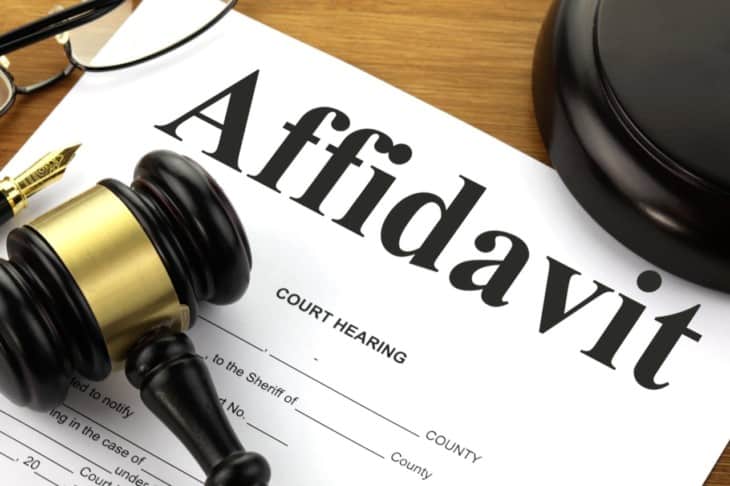What happens when a soldier serving overseas is sued in civil court? The defendant may need to produce a military affidavit of active-duty service. An affidavit is a written statement made under oath for use in legal proceedings, but what is a military affidavit exactly?
A military affidavit is a legal document that specifies whether an individual is on active military duty. Military affidavits are typically used to determine the active-duty status of a defendant in court. Most courts suspend civil proceedings when a defendant is unable to appear in court due to military obligations.
What Is an SCRA Affidavit?
The SCRA affidavit is another name for a military affidavit of military service. The Service Members Civil Relief Act (SCRA) is a law created to protect service members’ rights during military or uniformed service. The law offers several protections and applies:
- Active-duty members of the US armed forces
- Members of the Reserve component when serving on active duty
- Members of the National Guard component mobilized for 30 days
- Active duty commissioned officers of the Public Health Service
- Active duty commissioned officers of the National Oceanic and Atmospheric Administration
One of the protections provided by the SCRA is protection against default judgments in civil cases. If a defendant does not appear in court for a civil case, the judge may issue a default judgment in favor of the plaintiff. The SCRA protects against this outcome.
According to the SCRA, the party suing a service member must file an affidavit stating whether the defendant is currently in active-duty service. If the affidavit verifies that a service member is in active-duty service, the courts cannot enter a default judgment for up to one year after the end of their service.
Along with protecting against default judgments, the SCRA protects against repossession of property, home foreclosure, and termination of residential housing or automobile leases. The Attorney General is authorized to file federal lawsuits against individuals who violate the SCRA.
Military affidavits vary between jurisdictions. However, the typical affidavit includes just a few sections.
The plaintiff typically needs to check a box indicating whether the defendant is in active military service. They must also supply the sources they used to verify the defendant’s status.
Who Obtains a Military Affidavit?
The plaintiff or attorneys for the plaintiff in a civil case are responsible for obtaining a military affidavit when a service member cannot appear in court. The affidavit must state one of the following three things:
- The defendant is in military service
- The defendant is not in military service
- The plaintiff cannot determine whether the defendant is in military service
Individuals can verify the military service status of a soldier using the Department of Defense’s Defense Manpower Data Center (DMDC) database.
Additionally, a court may not enter a default judgment against a defendant until it appoints an attorney to represent its interests. If the appointed attorney is unable to contact the defendant, the court must delay the proceedings for at least 90 days.
Does a Military Affidavit Cover Foreclosures?
Section 3953 of the SCRA protects service members from nonjudicial foreclosures. However, military affidavits are most often used to protect against judicial foreclosure proceedings.
A foreclosure may be judicial or nonjudicial. Judicial foreclosures are handled through the court system while nonjudicial foreclosures do not involve the court. A military affidavit may be used to stay the civil proceedings for judicial foreclosure.
Service members do not need a military affidavit to protect against nonjudicial foreclosures, as the SCRA already offers protections. Under the SCRA, a creditor needs a court order before foreclosing on a property owned by an active member of the military.
The SCRA prevents nonjudicial foreclosures of active duty service members and offers protections for a tail coverage period. The tail coverage period is one year after a period of military service.
Do You Need a Military Affidavit to Prevent Repossessions?
A military affidavit may be needed by a creditor attempting to repossess an item, such as a vehicle, from a service member.
Under the SCRA, active-duty service members receive protection against repossessions during their military service. The creditor must obtain a court order to complete the repossession and some courts may require an affidavit to verify that the service member is no longer in active-duty service.
Related Posts












